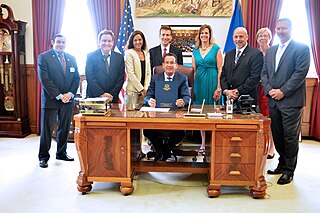Related Research Articles

Parole is a form of early release of a prison inmate where the prisoner agrees to abide by certain behavioral conditions, including checking-in with their designated parole officers, or else they may be rearrested and returned to prison.
Probation in criminal law is a period of supervision over an offender, ordered by the court often in lieu of incarceration.

The High Court of Justiciary is the supreme criminal court in Scotland. The High Court is both a trial court and a court of appeal. As a trial court, the High Court sits on circuit at Parliament House or in the adjacent former Sheriff Court building in the Old Town in Edinburgh, or in dedicated buildings in Glasgow and Aberdeen. The High Court sometimes sits in various smaller towns in Scotland, where it uses the local sheriff court building. As an appeal court, the High Court sits only in Edinburgh. On one occasion the High Court of Justiciary sat outside Scotland, at Zeist in the Netherlands during the Pan Am Flight 103 bombing trial, as the Scottish Court in the Netherlands. At Zeist the High Court sat both as a trial court, and an appeal court for the initial appeal by Abdelbaset al-Megrahi.

The Probation Service for England and Wales is a statutory criminal justice service, mainly responsible for the supervision of offenders in the community and the provision of reports to the criminal courts to assist them in their sentencing duties. It was established in its current form by the Criminal Justice and Court Services Act in April 2001, but has existed since 1907 as a set of area-based services interacting at arm's length with central government.

The courts of Scotland are responsible for administration of justice in Scotland, under statutory, common law and equitable provisions within Scots law. The courts are presided over by the judiciary of Scotland, who are the various judicial office holders responsible for issuing judgments, ensuring fair trials, and deciding on sentencing. The Court of Session is the supreme civil court of Scotland, subject to appeals to the Supreme Court of the United Kingdom, and the High Court of Justiciary is the supreme criminal court, which is only subject to the authority of the Supreme Court of the United Kingdom on devolution issues and human rights compatibility issues.

A probation and parole officer is an official appointed or sworn to investigate, report on, and supervise the conduct of convicted offenders on probation or those released from incarceration to community supervision such as parole. Most probation and parole officers are employed by the government of the jurisdiction in which they operate, although some are employed by private companies that provide contracted services to the government.

The Risk Management Authority is an executive non-departmental public body of the Scottish Government with responsibility for assessing and managing the risks posed by certain serious violent and sexual offenders in Scotland. It was established in 2005 by the Criminal Justice (Scotland) Act 2003.
A habitual offender, recidivist, repeat offender, or career criminal is a person convicted of a crime who was previously convicted of other crimes. Various state and jurisdictions may have laws targeting habitual offenders, and specifically providing for enhanced or exemplary punishments or other sanctions. They are designed to counter criminal recidivism by physical incapacitation via imprisonment.
In the jurisdiction of England and Wales, a Multi-Agency Public Protection Arrangement (MAPPA) is an arrangement, set up in 2001, for the "responsible authorities" tasked with the management of registered sex offenders, violent and other types of sexual offenders, and offenders who pose a serious risk of harm to the public. The "responsible authorities" of the MAPPA include the National Probation Service, HM Prison Service and England and Wales Police Forces. MAPPA is coordinated and supported nationally by the Public Protection Unit within the National Offender Management Service. MAPPA was introduced by the Criminal Justice and Court Services Act 2000 and was strengthened under the Criminal Justice Act 2003.
In England and Wales, life imprisonment is a sentence that lasts until the death of the prisoner, although in most cases the prisoner will be eligible for early release after a minimum term set by the judge. In exceptional cases a judge may impose a "whole life order", meaning that the offender is never considered for parole, although they may still be released on compassionate grounds at the discretion of the Home Secretary. Whole life orders are usually imposed for aggravated murder, and can only be imposed where the offender was at least 21 years old at the time of the offence being committed.

The Parole Board for England and Wales was established in 1968 under the Criminal Justice Act 1967. It became an independent executive non-departmental public body (NDPB) on 1 July 1996 under the Criminal Justice and Public Order Act 1994. The Parole Board is governed by the Parole Board Rules 2016 made by Parliament under the Criminal Justice Act 2003. Parole Board members are appointed by the Secretary of State for Justice, but are required to take judicial decisions independent of Government.
Indefinite imprisonment or indeterminate imprisonment is the imposition of a sentence by imprisonment with no definite period of time set during sentencing. It was imposed by certain nations in the past, before the drafting of the United Nations Convention against Torture (CAT). The length of an indefinite imprisonment was determined during imprisonment based on the inmate's conduct. The inmate could have been returned to society or be kept in prison for life.
In England and Wales, the imprisonment for public protection sentence was a form of indeterminate sentence introduced by section 225 of the Criminal Justice Act 2003 by the Home Secretary, David Blunkett, and abolished in 2012. It was intended to protect the public against criminals whose crimes were not serious enough to merit a normal life sentence but who were regarded as too dangerous to be released when the term of their original sentence had expired. It is composed of a punitive "tariff" intended to be proportionate to the gravity of the crime committed, and an indeterminate period which commences after the expiration of the tariff and lasts until the Parole Board judges the prisoner no longer poses a risk to the public and is fit to be released. The equivalent for under-18s was called detention for public protection, introduced by s. 226 of the 2003 Act. The sentences came into effect on 4 April 2005.

The judiciary of Scotland are the judicial office holders who sit in the courts of Scotland and make decisions in both civil and criminal cases. Judges make sure that cases and verdicts are within the parameters set by Scots law, and they must hand down appropriate judgments and sentences. Judicial independence is guaranteed in law, with a legal duty on Scottish Ministers, the Lord Advocate and the Members of the Scottish Parliament to uphold judicial independence, and barring them from influencing the judges through any form of special access.
The New Zealand Parole Board is an independent statutory body established in 2002 that considers offenders for parole. Its task "is to undertake an assessment of the risk that long-term sentenced offenders might pose to the safety of the community if they were to be released before the end of their sentence". The Board also sets conditions of release for offenders so their reintegration back in to the community can be effectively managed. Once the conditions are set it becomes the responsibility of Community Corrections to manage the offender." 'Long term' is defined as more than 24 months. Short-term prisoners are automatically released after serving half their sentence.
The New Zealand Probation Service is a branch or service of the New Zealand Corrections Department. Established in 1886, its role is to manage offenders sentenced to community based sentences such as home detention, community detention and intensive supervision. The Service also manages prisoners in the community who have been released on parole and offenders on release conditions at the end of their prison sentence. According to Corrections website, in 2014 the Service was looking after approximately 30,000 offenders in the community. The Probation Officer's role is described as "work(ing) with people on probation to motivate them to make changes in their lives. This may include attending programmes to address violence, alcohol and drug abuse or driving offences."

The Parole Board for Scotland is a tribunal non-departmental public body in Scotland first established in 1967, with responsibility for parole decisions. Its decision making and operating are independent of the Scottish Government, and many of its decisions are binding on Scottish Ministers. The Parole Board has statutory powers to:

Proposition 57 was an initiated California ballot proposition, approved on the November 8, 2016 ballot. The Proposition allows parole consideration for nonviolent felons, changes policies on juvenile prosecution, and authorizes sentence credits for rehabilitation, good behavior, and education.

The Scottish Sentencing Council is an advisory non-departmental public body in Scotland that produces sentencing guidelines for use in the High Court of Justiciary, sheriff courts and justice of the peace courts. Judges, sheriffs, and justices of the peace must use the guidelines to inform the sentence they pronounce against a convict, and they must give reasons for not following the guidelines.

Lifetime probation is reserved for relatively serious legal offenders. The ultimate purpose of lifetime probation is to examine whether offenders properly maintain good behavior as well as capability of patience under lifetime probation serving circumstance. An offender is required to abide by particular conditions for rest of their entire life in order to nurture superior social behaviour as a punishment for their criminal offence. Condition of probation orders contain supervision, electronic tagging, reporting to his or her probation or parole officer, as well as attending counselling. The essential component of lifetime probation carries the sense of being examined for well-being character and behaviour for life term period. Legislative framework regarding probation may vary depending on the country or the state within a certain country as well as the duration and condition of probational sentencing.
References
- ↑ "Criminal Justice (Scotland) Act 2003". www.legislation.gov.uk. The National Archives. 26 March 2003.
- ↑ "RMA Scotland | Order for Lifelong Restriction | FAQs". www.rmascotland.gov.uk. Risk Management Authority. 2005. Retrieved 13 April 2017.
- ↑ "Sentence Type | Parole Board for Scotland". www.scottishparoleboard.gov.uk. Parole Board for Scotland. Retrieved 13 April 2017.
- ↑ "About the Parole Board | Parole Board for Scotland". www.scottishparoleboard.gov.uk. Parole Board for Scotland. Retrieved 13 April 2017.
- ↑ Scottish Parliament. Act of Adjournal (Criminal Procedure Rules Amendment No. 3) (Risk Assessment Orders and Orders for Lifelong Restriction) 2006 as made, from legislation.gov.uk .
